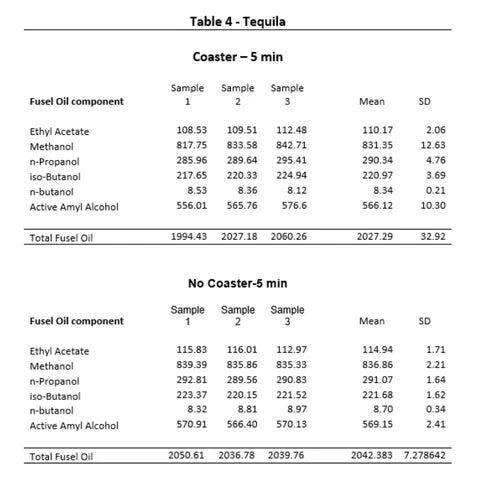By Dr. Alexis Kaplan, Affiliate Associate Professor, University of Washington, Seattle
Founder, ATK Innovation, Analytics & Discovery
When it comes to flavor, the smallest details make the biggest difference. Every sip of your favorite whiskey, wine, or tequila is a symphony of taste, aroma, and texture. Even microscopic shifts in a beverage’s chemical composition can dramatically change the way it’s perceived — from harsh to smooth, from sharp to balanced.
Key Takeaways
-
Independent lab testing confirmed measurable reductions in fusel oils in both whiskey and tequila after exposure to the BOĆE Quantum Coaster.
-
Even 5 minutes of exposure produced detectable changes.
-
Reduced fusel oils = smoother, cleaner flavor — verified by gas chromatography and statistical analysis.
-
Results align with sensory feedback from BOĆE users worldwide.
Understanding the Chemistry of Flavor
Flavor isn’t just about what meets the tongue. It’s the combined experience of taste, smell, and texture, shaped by how volatile compounds interact with your sensory receptors. Volatile compounds — those that easily vaporize — travel through the nasal passages to reach olfactory receptors, triggering much of what we perceive as aroma.
Because these interactions are so complex, small chemical changes can create large sensory differences. A slight drop in one compound can soften a drink’s sharpness; an increase in another can make it feel warm and round. These effects are nonlinear, meaning they don’t scale predictably with concentration — a concept that fascinates flavor scientists worldwide.
Fusel Oils: The Hidden Variable in Taste and Smoothness
Among the many compounds that shape a beverage’s profile, fusel oils are especially impactful. They’re a group of higher alcohols produced during fermentation, including methanol, propanol, butanol, and amyl alcohols.
In low levels, they add complexity. In higher concentrations, they cause burning, biting, and bitterness — the kind of harshness you feel in the back of your throat after a strong sip.
Distillers monitor fusel oils closely, as small variations can significantly alter the perceived quality of the spirit. A notable example is isoamyl alcohol, known for its biting taste even at low concentrations.
Independent Lab Testing: AAR Labs, Madison, Wisconsin
To explore how fusel oil content changes under quantum influence, AAR Labs conducted an independent analysis of whiskey and tequila samples exposed to the Rainwater Technologies (BOĆE) Quantum Coaster.
Testing followed the Alcohol and Tobacco Tax and Trade Bureau (TTB) method SSD:TM:200, using gas chromatography with flame ionization detection (GC-FID). Samples were placed on coasters for 5 minutes and 24 hours, while control samples were kept under identical conditions without coasters. Each sample was analyzed in triplicate.
Results: Significant Reductions in Fusel Oil Levels
Mean total fusel oil levels were reduced in both whiskey and tequila after BOĆE coaster exposure — even after just five minutes.
The reductions were most pronounced in whiskey after 24 hours, where key compounds like active amyl alcohol, iso-butanol, n-propanol, and methanol were significantly lower (p < 0.05, unpaired two-tailed t-test).
Figure 1. Total Fusel Oil – Whiskey (24-Hour Exposure)

Figure 2. Active Amyl Alcohol – Whiskey (24-Hour Exposure)

Figure 3. Iso-Butanol – Whiskey (24-Hour Exposure)

Figure 4. Total Fusel Oil – Tequila (24-Hour Exposure)

Figure 5. Active Amyl Alcohol – Tequila (24-Hour Exposure)

Figure 6. Methanol – Tequila (24-Hour Exposure)

Figure 7. Total Fusel Oil – Whiskey (5-Minute Exposure)

Figure 8. Total Fusel Oil – Tequila (5-Minute Exposure)

Tabulated Data: Fusel Oil Component Breakdown
Table 1. Whiskey – 24 Hours

Table 2. Tequila – 24 Hours

Consistent decreases across all measured compounds after coaster exposure.
Table 3. Whiskey – 5 Minutes

Measurable decreases in total fusel oils after only 5 minutes on the coaster.
Table 4. Tequila – 5 Minutes

Why This Matters
These findings confirm a striking principle: tiny molecular shifts can change everything about taste. Reducing harsh fusel oils enhances roundness, smoothness, and overall drinkability — validating what many BOĆE users describe in the BOĆE Challenge as that “What the heck?!” moment of difference. It’s measurable, repeatable, and grounded in science.





